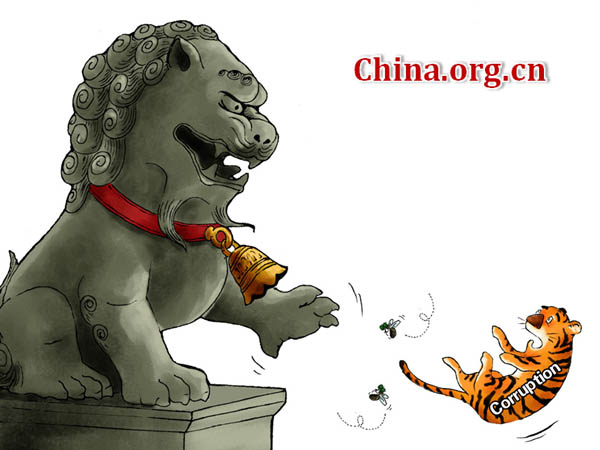Anti-corruption law should have teeth
- By Wu Jianxiong
 0 Comment(s)
0 Comment(s) Print
Print E-mail China Daily, March 16, 2015
E-mail China Daily, March 16, 2015
|
?[By Zhai Haijun/China.org.cn] |
At the annual sessions of the National People's Congress, or China's top legislature, and the Chinese People's Political Consultative Conference National Committee, its top advisory body, lawmakers said China should accelerate the drafting of national legislation on fighting corruption, because such legislation is critical to establishing the rule of law.
The ruling Communist Party of China, government and judicial authorities have indeed launched an effective multi-layer anti-corruption drive. But the country still has to put all the anti-corruption rules and regulations into one specific piece of law.
Corruption is a major problem across the world, and many countries and regions have made its eradication one of their main missions. Corruption can generally be eradicated through legislation, which is then strictly enforced by the judiciary. In some countries, irrespective of the amount involved, embezzlers and bribe-takers receive strict punishments, including "economic penalties" like fines, confiscation of properties and denial of pensions. Such measures, experts say, are aimed at deterring potential offenders.
China is a socialist country under the rule of the CPC, which has set higher standards and requirements for its members to fulfill in order to fight corruption. The Party's high-standard disciplinary rules and regulations are used to supervise and monitor Party members' activities, including their work and lifestyle. In terms of administrative supervision, public servants receive punishment in line with related administrative regulations for wrongdoings even if they do not qualify as corruption according to the criminal law. Of course, those who violate the law by engaging in corruption are also subjected to criminal punishment.
The existing mechanism to fight corruption highlights the core position of the Party and the layers to deal with corruption issues. But the law's function is somewhat limited in fighting against corruption, because it focuses on duty-related crimes. That makes it important to have a specific anti-corruption law comprising all the anti-graft rules and regulations of the Party and the government.
Given the complicated economic situation and social transformation, corruption poses a serious challenge to China. And China cannot meet this challenge without a comprehensive anti-corruption law, which, for example, details the nature and length of punishments people should receive for different types and levels of corruption.
Many corrupt officials transfer their illicit earnings to overseas banks or even flee to other countries to escape punishment and enjoy their illgotten gains. So China needs to ensure its ant-corruption law conforms to international practices. If corrupt officials who have fled to other countries can be extradited and their illgotten wealth returned, the fight against corruption can become more effective.
Therefore, China has to expedite the drafting of a specific and comprehensive law on corruption. But before finalizing the draft, lawmakers should study the anti-corruption laws of other countries and, if need be, incorporate their salient features into China's anti-corruption law.
The author is the director of the China Anti-Corruption Judicial Research Center in Beijing.






